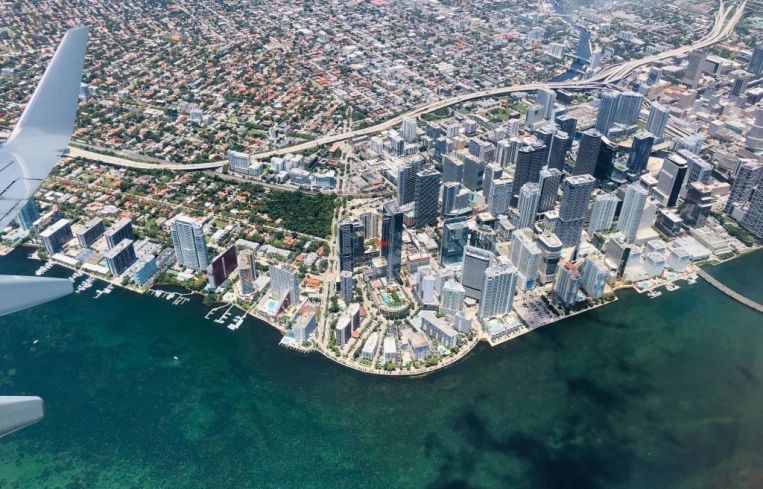Related Group Proposes Large Affordable-Housing Development in Downtown Miami
By Julia Echikson January 19, 2022 5:34 pm
reprints
Miami’s largest condominium developer, Related Group, is planning a large affordable-housing complex in one of the city’s most coveted neighborhoods.
The developer, along with its partner ROVR Development, is seeking approval to build a mixed-use development with 1,200 residential units across three towers in Downtown Miami, according to documents obtained by Commercial Observer.
The proposal comes as real estate prices are surging in Miami thanks to high-profile companies and wealthy Northerners relocating to the Magic City. In one year alone, the median sales price of Miami-Dade County condo units has grown by 28 percent, to $346,000, according to the latest data from the Miami Association of Realtors.
“We believe we’re at an inflection point in Miami, and that we have a crisis of affordability on our hands,” Oscar Rodriguez, a principal at ROVR Development, told Commercial Observer. “The individuals that have spent a larger part of their life working 50 hours a week are the backbone of our society, and they should be afforded an opportunity to also live in the central business district.”
A fifth of Related’s project, 240 apartments, is slated for “low-income households,” those whose income is no more than 50 percent of the area’s median income. Another 15 percent, 180 residences, would be reserved for “workforce households,” defined as those earning no more than 140 percent of the area’s median income. The remaining units will be offered as market-rate rentals.
The development would replace an existing parking lot, College Station Garage, located at 190 NE 3rd Street, only a city block away from Bayfront Park. The residential high-rises, which will soar between 39 and 48 stories, would sit above a new parking lot with over 1,350 spaces, which the parking authority would own.
For the two first floors, the developers are proposing to either build spaces for public services — a 20,775-square-foot urgent care center, a 13,909-square-foot fire station, and a 3,950-square-foot art center — or a retail-heavy component with 50,339 square feet. The taking rent could fetch as high as $100 a foot, triple net.
While Related and ROVR say the proposal for the affordable component is not contingent on receiving public subsidies, they plan to fund the construction through tax-exempt bonds issued by The Housing Finance Authority of Miami-Dade County or Florida Housing Finance Corporation, in addition to 4 percent Low-Income Housing Tax Credits and developer and partner equity.
Through a 99-year ground lease, the proposed development is projected to generate over $1.2 billion in revenue for the Miami Parking Authority (MPA), according to the developers. They’re offering to pay the MPA “10 percent of project’s annual net cash flows after repayment of equity and an 8 percent preferred return.”
But Related and ROVR have competition from David Martin’s Terra, which also submitted a proposal, according to ROVR’s Rodriguez. Terra has come under scrutiny over its alleged role in the Champlain Towers South condo’s deadly collapse. Last November, surviving residents and victims’ families sued Terra, alleging their construction of the development next door to Champlain weakened the building’s structure. Terra and its partners deny wrongdoing. The class-action lawsuit will head to trial in March 2023.
If the MPA selects Related and ROVR, Rodriguez expects negotiations for the ground lease to close within the next 120 days. Construction would commence during the first quarter of 2023 and conclude in the following 60 months.
Long-neglected Downtown Miami has today become a sought-after district. It’s situated between other popular neighborhoods such as Brickell and Wynwood and causeways that lead into Miami Beach. The district’s waterfront condominiums — such as the Zaha Hadid-designed One Thousand Museum, which counts nightlife mogul David Grutman as well as David and Victoria Beckham as unit owners — are some of the priciest in Miami.
But Downtown Miami only holds 8,571 housing units, far less than either Brickell and Edgewater, another adjacent neighborhood, which together boast more than 32,793 residences, according to a report from The Miami Downtown Development Authority (DDA).
Developers are rushing into Downtown Miami to meet housing demand. The district is home to Miami Worldcenter, one of the largest master-planned developments in the country, spanning 27 acres.
Within the mega-development, Related and Merrimac Ventures are developing The Crosby, a 450-unit condominium. Just last week, The Witkoff Group submitted plans to build the largest residential complex in Downtown Miami with 2,195 apartments.
Julia Echikson can be reached at Jechikson@commercialobserver.com.
Update: The article was updated to include Terra’s position regarding the pending lawsuit over the Champlain Towers South Collapse.



